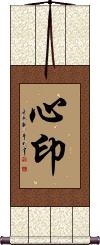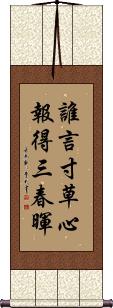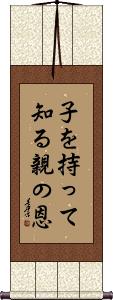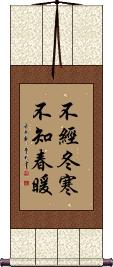Many custom options...
And formats...

Appreciation in Chinese / Japanese...
Buy an Appreciation calligraphy wall scroll here!
Personalize your custom “Appreciation” project by clicking the button next to your favorite “Appreciation” title below...
Appreciation of Truth by Meditation
心印 is a Buddhist concept that simply stated is “appreciation of truth by meditation.”
It's a deep subject, but my understanding is that you can find truth through meditation, and once you've found the truth, you can learn to appreciate it more through further meditation. This title is not commonly used outside of the Buddhist community (your Asian friends may or may not understand it). The literal translation would be something like “the mind seal,” I've seen this term translated this way from Japanese Buddhist poetry. But apparently, the seal that is stamped deep in your mind is the truth. You just have to meditate to find it.
Soothill defines it this way: Mental impression, intuitive certainty; the mind is the Buddha-mind in all, which can seal or assure the truth; the term indicates the intuitive method of the Chan (Zen) school, which was independent of the spoken or written word.
Reference: Soothill-Hodous Dictionary of Chinese Buddhism
See Also: Zen
Appreciation and Love for Your Parents
誰言寸草心報得三春暉 is the last line of a famous poem. It is perceived as a tribute or ode to your parents or mother from a child or children that have left home.
The poem was written by Meng Jiao during the Tang Dynasty (about 1200 years ago). The Chinese title is “You Zi Yin” which means “The Traveler's Recite.”
The last line as shown here speaks of the generous and warm spring sunlight which gives the grass far beyond what the little grass can could ever give back (except perhaps by showing its lovely green leaves and flourishing). The metaphor is that the sun is your mother or parents, and you are the grass. Your parents raise you and give you all the love and care you need to prepare you for the world. A debt that you can never repay, nor is repayment expected.
The first part of the poem (not written in the characters to the left) suggests that the thread in a loving mother's hands is the shirt of her traveling offspring. Vigorously sewing while wishing them to come back sooner than they left.
...This part is really hard to translate into English that makes any sense but maybe you get the idea. We are talking about a poem that is so old that many Chinese people would have trouble reading it (as if it was the King James Version of Chinese).
No man knows what he owes to his parents until he comes to have children of his own
子を持って知る親の恩 literally translates as: Only after you have a baby, you would appreciate your parents (feel the way they do, etc).
This is a bit like the “walk a mile in another man's shoes” saying. Basically, it's about you cannot fully understand the plight of others until you experience it yourself. It also shows appreciation for the plight of parents.
This Japanese proverb can also be translated a few more ways:
No man knows what he owes to his parents till he comes to have children of his own.
One knows not what one owes to one's parents till one comes to have children of one's own.
Only after you have a baby, you will appreciate your parents or feel the way they do.
Only after becoming a parent yourself do you realize how much you owe [how indebted you are] to your own parents.
Note: Because this selection contains some special Japanese Hiragana characters, it should be written by a Japanese calligrapher.
You must endure a harsh winter to appreciate the warmth of springtime
You must know hardship to appreciate happiness
This literally translates as: Without having experienced the cold of winter, one cannot appreciate the warmth of spring.
Figuratively, this means: One cannot truly appreciate happiness without having gone through hardship.
There are many contrasts in life. One simply cannot fully know what joy is without having experienced misery, difficulty, and pain. How could you explain “light” if you did not have “darkness” to compare it to?
Embrace hardship, as it makes the good times seem even better.
This in-stock artwork might be what you are looking for, and ships right away...
Not the results for appreciation that you were looking for?
Below are some entries from our dictionary that may match your appreciation search...
| Characters If shown, 2nd row is Simp. Chinese |
Pronunciation Romanization |
Simple Dictionary Definition |
勞 劳 see styles |
láo lao2 lao rō |
More info & calligraphy: RauToil, labour, trouble; to reward. |
感謝 感谢 see styles |
gǎn xiè gan3 xie4 kan hsieh kansha かんしゃ |
More info & calligraphy: Gratitude / Thanks(n,vs,vt,vi) thanks; gratitude; appreciation; thankfulness |
教養 教养 see styles |
jiào yǎng jiao4 yang3 chiao yang kyouyou / kyoyo きょうよう |
More info & calligraphy: Education / Refinement(understanding or appreciation of) culture; (one's) education; cultivation; sophistication; refinement |
物の哀れ see styles |
mononoaware もののあわれ mononoahare もののあはれ |
More info & calligraphy: Mono no Aware |
嗯 see styles |
en en5 en |
interjection indicating approval, appreciation or agreement |
了知 see styles |
liǎo zhī liao3 zhi1 liao chih ryouchi / ryochi りょうち |
(Buddhism) to fully understand; to understand completely (noun, transitive verb) knowing; understanding; appreciation Parijñā, thorough knowledge. |
会得 see styles |
etoku えとく |
(noun, transitive verb) understanding; comprehension; grasp; perception; appreciation; mastery (of an art or skill) |
円高 see styles |
endaka えんだか |
(ant: 円安) appreciation of the yen; strong yen |
労い see styles |
negirai ねぎらい |
appreciation; thanks; gratitude |
叨擾 叨扰 see styles |
tāo rǎo tao1 rao3 t`ao jao tao jao |
to bother; to trouble; (polite expression of appreciation for time taken to hear, help or host the speaker) sorry to have bothered you; thank you for your time |
味読 see styles |
midoku みどく |
(noun, transitive verb) reading with appreciation; savouring (a book); enjoying |
咀嚼 see styles |
jǔ jué ju3 jue2 chü chüeh soshaku そしゃく |
to chew; to think over (noun, transitive verb) (1) chewing; mastication; (noun, transitive verb) (2) digestion (e.g. of words); assimilation; comprehension; appreciation |
垂青 see styles |
chuí qīng chui2 qing1 ch`ui ch`ing chui ching |
to show appreciation for sb; to look upon sb with favor |
審美 审美 see styles |
shěn měi shen3 mei3 shen mei shinbi しんび |
esomethingetics; appreciating the arts; taste aesthetic appreciation; (personal name) Shinbi |
寸志 see styles |
sunshi すんし |
small present; small token of appreciation; with compliments (e.g. written on small gift) |
惜才 see styles |
xī cái xi1 cai2 hsi ts`ai hsi tsai |
to have an appreciation for talent in another person |
意思 see styles |
yì si yi4 si5 i ssu ishi いし |
idea; opinion; meaning; wish; desire; interest; fun; token of appreciation, affection etc; CL:個|个[ge4]; to give as a small token; to do something as a gesture of goodwill etc intention; wish; purpose; mind (to do) mindfulness |
感佩 see styles |
gǎn pèi gan3 pei4 kan p`ei kan pei kanpai かんぱい |
to admire with gratitude (n,vs,vi) deep gratitude; heartfelt appreciation; not forgetting to express one's gratitude |
感得 see styles |
gǎn dé gan3 de2 kan te kantoku かんとく |
(noun, transitive verb) (1) (profound) realization; awareness; appreciation; becoming (spiritually) awakened (to); (noun, transitive verb) (2) one's faith being transmitted to a deity and one's wish then being granted; (noun, transitive verb) (3) (archaism) obtaining (something) unexpectedly to attain |
慰勞 慰劳 see styles |
wèi láo wei4 lao2 wei lao |
to show appreciation (by kind words, small gifts etc); to comfort |
深謝 see styles |
shinsha しんしゃ |
(n,vs,vt,vi) (1) deep appreciation; deep gratitude; (n,vs,vt,vi) (2) sincere apology |
犒い see styles |
negirai ねぎらい |
appreciation; thanks; gratitude |
玩味 see styles |
wán wèi wan2 wei4 wan wei ganmi がんみ |
to ruminate; to ponder subtleties (noun/participle) relish; appreciation |
理解 see styles |
lǐ jiě li3 jie3 li chieh rikai りかい |
to comprehend; to understand (noun, transitive verb) (1) understanding; comprehension; appreciation; (noun, transitive verb) (2) sympathy to comprehend |
称美 see styles |
shoubi / shobi しょうび |
(noun/participle) admiration; praise; prizing; appreciation; (personal name) Shoubi |
耐看 see styles |
nài kàn nai4 kan4 nai k`an nai kan |
able to withstand careful appreciation; well worth a second look |
薄志 see styles |
hakushi はくし |
weak-willed; a small token of appreciation |
観賞 see styles |
kanshou / kansho かんしょう |
(noun, transitive verb) admiration; appreciation; enjoyment; viewing (for pleasure) |
評価 see styles |
hyouka / hyoka ひょうか |
(noun, transitive verb) (1) valuation; appraisal; evaluation; assessment; estimation; rating; judging; (noun, transitive verb) (2) appreciation; recognition; acknowledgement; rating highly; praising |
詩眼 see styles |
shigan しがん |
poetic appreciation; poetic taste |
Click here for more appreciation results from our dictionary
The following table may be helpful for those studying Chinese or Japanese...
| Title | Characters | Romaji (Romanized Japanese) | Various forms of Romanized Chinese | |
| Appreciation of Truth by Meditation | 心印 | shin nin / shinnin | xīn yìn / xin1 yin4 / xin yin / xinyin | hsin yin / hsinyin |
| Appreciation and Love for Your Parents | 誰言寸草心報得三春暉 谁言寸草心报得三春晖 | shuí yán cùn cǎo xīn bào dé sān chūn huī shui2 yan2 cun4 cao3 xin1 bao4 de2 san1 chun1 hui1 shui yan cun cao xin bao de san chun hui | shui yen ts`un ts`ao hsin pao te san ch`un hui shui yen tsun tsao hsin pao te san chun hui |
|
| No man knows what he owes to his parents until he comes to have children of his own | 子を持って知る親の恩 | ko wo motte shiru oya no on kowomotteshiruoyanoon | ||
| You must endure a harsh winter to appreciate the warmth of springtime | 不經冬寒不知春暖 不经冬寒不知春暖 | bù jīng dōng hán bù zhī chūn nuǎn bu4 jing1 dong1 han2 bu4 zhi1 chun1 nuan3 bu jing dong han bu zhi chun nuan | pu ching tung han pu chih ch`un nuan pu ching tung han pu chih chun nuan |
|
| In some entries above you will see that characters have different versions above and below a line. In these cases, the characters above the line are Traditional Chinese, while the ones below are Simplified Chinese. | ||||
Successful Chinese Character and Japanese Kanji calligraphy searches within the last few hours...








